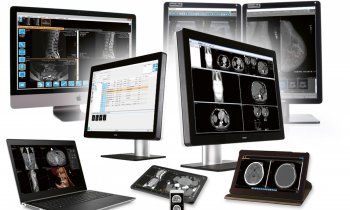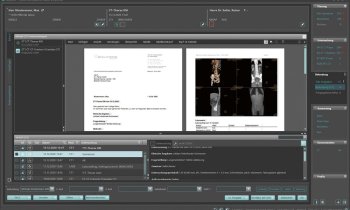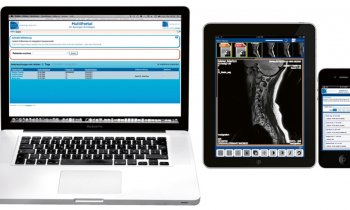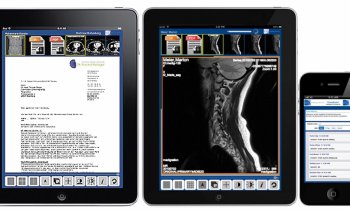Patient data: ‘learning to walk’ across Europe
Europe would cope much better with some of its most urgent social challenges if it was to fully utilize the entire potential of information and communication technology. These challenges include the ageing population, rising healthcare costs and the integration of the disabled. This is stated in the European Commission’s digital agenda for Europe. The digital agenda 2020 is one of the topics at the Medica Media Forum, which began yesterday and is continuing until Saturday 20 November.
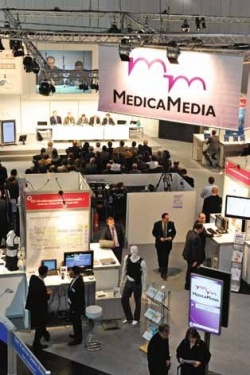
The digital agenda forms the EC’s framework for the key actions that will serve to systematically approach its seven key objectives. For example, one of these objectives is access to their online patient files for patients everywhere in the EU by 2015. Pilot measures are due to begin to ensure that European citizens will have secure online access to their healthcare data by 2015 at the latest, and also to ensure a widespread introduction of telemedical services by 2020. Moreover, there is a recommendation for a common, standard, minimum set of patient data to ensure interoperability between the member states for access to, and electronic exchange of, patient files by 2012.
What is the current status of this ambitious project?
Initiatives and projects on the digital agenda 2020 were introduced during a panel discussion on Wednesday at Medica, an event introduced by Dr Karl Stroetmann. He recently talked about the epSOS (European Smart Open Services) project initiated by the EU. Electronic emergency patient files and electronic prescriptions are the central applications. Dr Stroetman found that project work for the epSOS has facilitated the first ever systematic comparison of all national guidelines on electronic patient files and e-prescriptions. The study, being carried out by empirica GmbH, in Bonn, Germany, on behalf of the EC Directorate General, is not yet completed. Professor Kurt Marquardt, Head of Electronic Data Processing at the Rhön Klinikum AG, in Bad Neustadt/Saale, spoke about application scenarios on electronic case files, patient files and healthcare files.
The Rhön Klinikum AG is a member of the Association for Electronic Case Files. In July 2010, this organisation announced that the electronic case file will be the first value added service to be included in the German telematics infrastructure. The migration of this cross-sectoral and cross-institutional communication standard is to occur in parallel to the development of the basic infrastructure and its key applications. Prof. Marquardt presented application scenarios for electronic case files, and examined solutions in a national and international context.
‘Healthcare needs Service’, is Uwe Pöttgen’s motto, who, as Head of IT at the Asklepios Hospital Group talked about the ‘Future Hospital Programme’ run by this chain of private hospitals. In April this year, he announced that data gathered from healthy individuals are to be integrated into the treatment process at the Asklepios Hospitals. This is aimed at developing solution scenarios that will benefit individuals when they are still healthy and before they become patients. He also discussed smartphone applications. E-health services on the internet, e-health services on the mobile and e-health at home are three further kinds of healthcare to be offered, which will all be closely linked. For example, appointments can be booked through a mobile service application for iPhones and other mobile phones. Healthcare customers can use this simple and convenient service that has been developed, and is offered by CompuGROUP and the Asklepios Hospitals. Wolfgang Dorst, of BITKOM, (Federal Association for Information Technology, Telecommunications and New Media) and market developer for strategic projects at Sun Microsystems GmbH, discussed strategic considerations on the mobile utilisation of patient-oriented healthcare services. ‘Patient, Healthcare’ and Case Files’ is one of the central topics at the MEDICA Media
Forum.
All Medica participants who are showcasing products on this topic (more than 60 companies) are listed in their own separate brochure, which also lists the relevant events at the Medica Media Forum. The brochure links specialist topics and exhibitors and offers a useful guide to doctors, hospitals operators and hospital management, but also to members of other healthcare professions and healthcare leaders. In the preamble, Professor Otto Rienhoff, speaker of the advisory committee, and Dr Franz-Joseph Bartman, head of the Committee on Telematics at the German Medical Association, state: ‘Personal electronic healthcare files, coupled with medical knowledge bases and mobile electronic services and communications facilities, will form an important tool within the range of healthcare services.’ The Medica Media Forum offers tours, by appointment, to the relevant exhibitors. These are scheduled for Thursday, Friday and Saturday (18-20 November) from 1-2 p.m. A separate, 34-page brochure on healthcare files includes information on supplier systems and user systems. Both brochures as well as further information can be found at www.medicamedia.de
Report: Lutz Retzlaff
18.11.2010







